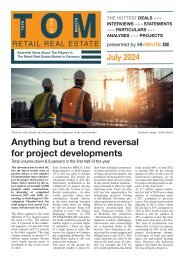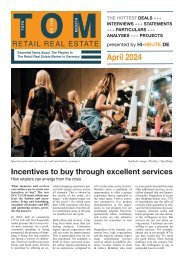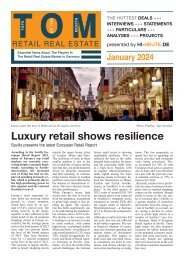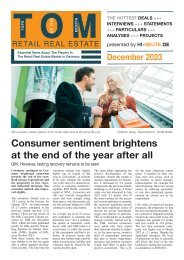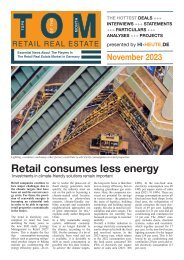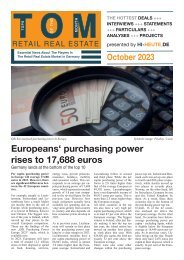TOM June 2024
You also want an ePaper? Increase the reach of your titles
YUMPU automatically turns print PDFs into web optimized ePapers that Google loves.
T<br />
TOPS<br />
M<br />
OF THE MONTH<br />
<strong>TOM</strong>O<br />
RETAIL REAL ESTATE<br />
TOPS<br />
OF THE<br />
MONTH<br />
Essential News About The Players In In<br />
The Retail Real Property Estate Market In in Germany<br />
THE HOTTEST DEALS +++<br />
INTERVIEWS +++ STATEMENTS<br />
+++ PARTICULARS +++<br />
ANALYSES +++ PROJECTS<br />
presented by HI-HEUTE.DE<br />
<strong>June</strong> <strong>2024</strong><br />
The food retail sector is operating in a highly competitive environment. <br />
Food retail under<br />
intense competitive pressure<br />
Youngest Report of the German Retail Association also analyses consumer demands<br />
The latest food retail report<br />
from the German Retail Association<br />
shows the complexity<br />
of the value chain, the intensity<br />
of competition in the food<br />
retail sector and consumer expectations<br />
of the industry.<br />
„The food retail value chain is<br />
complex. Food retailers have an<br />
important position here, but not<br />
an absolutely market-significant<br />
one compared to producers and<br />
growers,“ says HDE Managing<br />
Director Stefan Genth. With its<br />
well-known supermarkets and<br />
discounters, the food retail sector<br />
is present with consumers<br />
on a daily basis. However, it<br />
only buys a fraction of the agricultural<br />
products produced in<br />
Germany from the preliminary<br />
stages. Only twelve per cent of<br />
the fresh milk produced in Germany<br />
ends up on the shelves of<br />
food retailers. According to the<br />
Food Trade Report, the food<br />
industry and wholesalers as importers<br />
in particular generated<br />
the highest sales in 2023.<br />
„The role of food retailers in pricing<br />
is therefore subordinate on<br />
the market,“ Genth continued.<br />
Numerous product groups are<br />
characterised by foreign trade<br />
and demand from the food processing<br />
industry. „In the case of<br />
fresh food, food retailers are not<br />
the most important negotiating<br />
partner for agricultural producers.<br />
The recurring discussions<br />
about the role of food retailers<br />
in the level of farmers‘ earnings<br />
are therefore not expedient,“<br />
emphasised Genth.<br />
The Food Trade Report also<br />
shows that consumers have high<br />
expectations of food retailers.<br />
For around two thirds of consumers,<br />
a product range with the<br />
best possible price-performance<br />
ratio is particularly important. A<br />
large selection of different products<br />
(60.9 per cent), consistently<br />
high product quality (60.5<br />
per cent) and good accessibility<br />
of shops (59.8 per cent) are also<br />
among the most important services<br />
provided by food retailers<br />
from a consumer perspective.<br />
„The food retail sector meets<br />
the wishes of consumers with<br />
Symbolic image: Pixabay / TaWiPoP<br />
a variety of different business<br />
concepts and a wide range of<br />
products and assortments. Reliability,<br />
quality and variety are<br />
valued by customers,“ continued<br />
Genth.<br />
Interest in the food retailer‘s<br />
own brands has grown in recent<br />
years. Over 85 per cent of those<br />
surveyed think it is good when<br />
own brands are offered in shops<br />
alongside branded products. A<br />
range of organic products is also<br />
important. This is now expected<br />
by more than 60 per cent of respondents.<br />
„Customers‘ price<br />
sensitivity and their increased<br />
awareness of sustainability are<br />
reflected in the product ranges<br />
and offers of food retailers,“<br />
says Genth.
Page 2 T O M<br />
NEWS<br />
<strong>June</strong> <strong>2024</strong><br />
ECE‘s Retail Meeting<br />
celebrates its anniversary<br />
Around 800 participants at the industry get-together in Hamburg<br />
Twenty years of networking<br />
and exchange in the retail real<br />
estate sector: at this year‘s<br />
edition of ECE Marketplaces‘<br />
international Retail Meeting ,<br />
around 800 top decision-makers,<br />
experts and partners<br />
from the retail, hospitality,<br />
placemaking and entertainment<br />
sectors met in Hamburg‘s<br />
Fischauktionshalle to<br />
exchange views on current<br />
topics as well as the opportunities<br />
and challenges in the<br />
retail real estate sector.<br />
Numerous industry players took part in ECE‘s twentieth Retail<br />
Meeting. <br />
Photo: ECE<br />
The ECE Retail Meeting was<br />
first held in 2003 and has since<br />
developed into the largest<br />
industry meeting of its kind<br />
in Europe. This year‘s discussions<br />
and the panel talk at the<br />
start with high-ranking speakers<br />
focused on the diverging<br />
development in the retail sector<br />
with a continuing high number<br />
of insolvencies on the one hand<br />
and many successful expanding<br />
concepts on the other, the great<br />
importance of future-oriented<br />
investments and partnershipbased<br />
cooperation between<br />
tenants and investors for the<br />
sustainable success of retail locations<br />
as well as success factors<br />
for the stable performance<br />
of shopping centres.<br />
Common<br />
understanding<br />
„The large number of participants<br />
at our Retail Meeting<br />
shows us once again how important<br />
it is to work in partnership<br />
and have a common understanding<br />
of the opportunities<br />
and challenges in the industry in<br />
order to successfully move the<br />
retail real estate sector forward<br />
and develop it for the future,“<br />
says Joanna Fisher, CEO of<br />
ECE Markeptlaces. „Successful<br />
examples of best practice and<br />
the positive developments in the<br />
shopping centre segment are a<br />
good basis for driving forward<br />
the necessary transformation together.“<br />
European GfK study:<br />
Luxembourgers spend<br />
the most money in the<br />
retail sector<br />
According to a recent GfK<br />
study, the average European<br />
spends 6,517 euros per year<br />
in the retail sector. Purchasing<br />
power is highest in Luxembourg<br />
at 12,067 euros and lowest in<br />
Romania at 2,986 euros. Switzerland<br />
follows in second place<br />
with 11,617 euros , Austria in<br />
eighth place with 8,041 euros;<br />
Germany is in mid-table with<br />
6,667 euros, in 13th place out of<br />
25. Overall, the countries analysed<br />
have a spending potential of<br />
3.4 trillion euros.<br />
Paunsdorf Centre and<br />
Skyline Plaza are<br />
apparently to be sold<br />
Apparently, two large shopping<br />
centres are being offered for<br />
sale. According to information<br />
from Thomas Daily / CoStar<br />
News, Unibail-Rodamco-Westfield<br />
is planning to sell the<br />
Paunsdorf Centre in Leipzig<br />
(via CBRE). In addition, the<br />
Skyline Plaza shopping centre<br />
in Frankfurt, owned by Pimco<br />
Real Estate, CA Immo and ECE,<br />
is also coming onto the market<br />
(via JLL). The Paunsdorf Center<br />
was opened in 1994 and modernised<br />
in 2012 with the purchase<br />
by URW.<br />
Opening date for Überseequartier finalised<br />
URW initially prioritises retail, gastronomy and leisure<br />
Aftersome back and forth, the<br />
date for the grand opening of<br />
Westfield Hamburg-Überseequartier<br />
has now been finalised.<br />
The grand opening will<br />
take place on 17 October.<br />
Westfield Hamburg-Überseequartier opens in mid-October.<br />
<br />
Visualisation: URW<br />
Jakub Skwarlo, Chief Operating<br />
Officer Central Europe at Unibail-Rodamco-Westfield,<br />
says:<br />
„With the opening of Westfield<br />
Hamburg-Überseequartier, we<br />
are creating a new piece of city<br />
for Hamburg and bringing the<br />
heart of HafenCity to life. It is a<br />
unique urban development project<br />
in which a former industrial<br />
site is being transformed into a<br />
vibrant place for people, especially<br />
for the local community.<br />
Together with our partners from<br />
the retail, catering and entertainment<br />
sectors as well as offices,<br />
hotels and residential properties,<br />
we are working with full<br />
commitment towards the opening<br />
and are looking forward to<br />
the Grand Opening. We are all<br />
firmly convinced of the attractiveness<br />
and uniqueness of the<br />
project. We are looking forward<br />
to this milestone and would like<br />
to express our sincere thanks to<br />
all those involved and our partners.“<br />
Occupancy rate 93<br />
per cent<br />
As planned, the residential, office<br />
and hotel spaces will be occupied<br />
and opened successively<br />
after the grand opening.<br />
The focus of the opening on<br />
17 October will be on retail,<br />
gastronomy and leisure with<br />
entertainment and culture. The<br />
occupancy rate for these areas is<br />
currently 93 per cent, and only<br />
a few units are still available in<br />
the quarter.
Page 3 T O M<br />
TOP STATEMENT OF THE MONTH <strong>June</strong> <strong>2024</strong><br />
TOP STATEMENT<br />
<strong>June</strong><br />
„There is an obligation<br />
to open in the shopping<br />
centres, which is<br />
stipulated in the rental<br />
agreements. Nevertheless,<br />
due to a lack of<br />
staff, various tenants<br />
are hardly in a position<br />
to fully implement<br />
this.“<br />
Joachim Will (ecostra), who<br />
produces the annual „Shopping<br />
Centre Performance Report“<br />
for Germany and Austria with<br />
his company in an article of the<br />
in an article in the trade journal<br />
„Textilwirtschaft“
Page 5 T O M<br />
ANALYSES <strong>June</strong> <strong>2024</strong><br />
Delivery services: market<br />
shakeout now evident<br />
Aengevelt Research: This has had an impact on the property industry<br />
According to analyses by the<br />
Düsseldorf-based real estate<br />
services company Aengevelt,<br />
delivery services were recently<br />
regarded as stars of the<br />
start-up scene and as a rapidly<br />
expanding, financially<br />
strong demand group for inner-city<br />
commercial space to<br />
set up the necessary warehouses<br />
close to customers. In the<br />
meantime, many have become<br />
disillusioned.<br />
Examples of recent problematic<br />
developments include the Getir<br />
group of companies, which<br />
first took over struggling sector<br />
competitor Gorillas, but is now<br />
withdrawing from numerous<br />
markets itself. Picnic, on the<br />
other hand, continues to expand<br />
strongly and is increasing its annual<br />
turnover, but also - at least<br />
so far - its annual losses.<br />
Food delivery services are in a phase of market consolidation. <br />
Food delivery services are by<br />
no means a new development.<br />
Frozen food suppliers Bofrost<br />
and Eismann, for example, have<br />
been on the market since 1966<br />
and 1974 respectively. Regional<br />
beverage suppliers have also<br />
been active on regional markets<br />
for a long time and have<br />
gained a national competitor in<br />
Flaschenpost. Restaurants have<br />
been offering delivery services<br />
for decades, which they finance<br />
in part from the difference between<br />
the full VAT rate for food<br />
consumed in the restaurant and<br />
the reduced VAT rate for delivered<br />
meals. Online portals such<br />
as Lieferando have entered this<br />
segment.<br />
A new market segment is delivery<br />
services that offer online<br />
orders and home deliveries for<br />
the typical product ranges of<br />
discount food retailers, such<br />
as fruit and vegetables or dairy<br />
products. These include REWE,<br />
Flaschenpost, Gorillas and Picnic.<br />
This segment in particular<br />
also requires commercial space<br />
close to customers in city centres<br />
in order to store the corresponding<br />
product range and<br />
deliver it to end customers quickly.<br />
There are several drivers for the<br />
expansion of the delivery business.<br />
For example, digitalisation<br />
has simplified and accelerated<br />
the ordering process, meaning<br />
that customers now only need<br />
three minutes on average to place<br />
an order, which usually saves<br />
them more than half an hour of<br />
valuable time that they would<br />
have had to spend shopping in a<br />
shop. What‘s more, the coronavirus<br />
pandemic has fuelled online<br />
retail as a whole, which has<br />
also benefited food delivery services.<br />
The growing trend among<br />
the younger generation in urban<br />
areas to do without their own<br />
cars is also fuelling interest in<br />
delivery services. According to<br />
Aengevelt‘s forecast, most of<br />
these factors will become even<br />
more important in the future,<br />
even once the pandemic is over<br />
and bricks-and-mortar retail has<br />
regained market share.<br />
However, delivery services are<br />
an „emerging market“. Aengevelt<br />
Research points out that<br />
such new developments and<br />
trends exhibit typical cycles until<br />
they develop into „mature“<br />
markets. Typically, new goods<br />
or services are initially adopted<br />
by „innovators“, who are<br />
usually younger, have a higher<br />
level of education and income,<br />
are willing to take risks and are<br />
also able to pay higher prices<br />
for new offers or forms of supply<br />
because they see themselves<br />
as avant-garde. These pioneers<br />
are generally followed by „early<br />
adopters“, who are also characterised<br />
by higher education and<br />
higher income and see the use<br />
of new goods or services as a<br />
welcome attraction and also a<br />
source of prestige. Innovators<br />
and early adopters enable providers<br />
of new products to compensate<br />
for typical initial losses<br />
more quickly through higher<br />
prices and to achieve the economies<br />
of scale required to win<br />
over the mass public more quickly.<br />
Electronic gadgets, wellness<br />
services and electric vehicles<br />
are good examples of this<br />
emerging market cycle. On the<br />
supplier side, emerging markets<br />
are characterised by the fact<br />
that numerous start-ups enter<br />
the markets in the early phase,<br />
some of which are taken over<br />
by companies that are generally<br />
quite well-funded, while at the<br />
Symbolic image: AdobeStock<br />
same time the market is being<br />
shaken out.<br />
Delivery services differ from<br />
other emerging markets in that<br />
they did not start out with particularly<br />
high-quality and highpriced<br />
products such as organic<br />
food or luxury food. Instead,<br />
they have demanded low to<br />
extremely low delivery prices<br />
from the outset in order to lure<br />
customers away from bricksand-mortar<br />
retailers.<br />
For property owners, this means<br />
that, depending on business<br />
development and strategic (re)<br />
orientation, shops rented by<br />
delivery services could be relinquished<br />
after a relatively short<br />
time, for example if the providers<br />
withdraw from the local<br />
market or withdraw completely<br />
from Germany. Conversely, the<br />
delivery services that remain on<br />
the market will build up a hierarchy<br />
of locations - with supraregional<br />
goods distribution centres,<br />
urban logistics centres and<br />
small to medium-sized hubs at<br />
district level, for example if deliveries<br />
are made by cargo bike<br />
and not by small trucks.
The art of<br />
investing<br />
Tailor-made investments in German supermarkets<br />
As real estate experts, we invest in grocery stores<br />
and retail parks throughout Germany.<br />
The advantage?<br />
Financially very strong tenants and crisis-proof basic<br />
supply ensure sustainable attractive returns for<br />
investors.<br />
20 years of experience in food retail<br />
Excellent network<br />
Working in partnership<br />
Big plans? So do we.<br />
Talk to us:<br />
Jörn Burghardt • Managing Director<br />
Phone: +49 (69) 756694334 • E-mail: j.burghardt@g-pep.com<br />
GPEP GmbH · Hamburger Allee 26-28 · 60486 Frankfurt/Main GERMANY • www.g-pep.com
Page 7 T O M<br />
GUEST CONTRIBUTION <strong>June</strong> <strong>2024</strong><br />
Anything but sustainable<br />
Why Temu, Shein and co. need to be put in their place - an opinion piece by well-known<br />
specialised journalist Christian Hunziker<br />
It is always fascinating to<br />
look around the Temu and<br />
Shein websites. If you absolutely<br />
need a stainless steel<br />
prawn peeler - no problem,<br />
you can order one from Shein<br />
for 1.24 euros. If you fancy a<br />
set of four gold-coloured cake<br />
shovels, you can get them for<br />
1.63 euros. Five pairs of boxer<br />
shorts for 7.79 euros, a pair of<br />
children‘s shoes for 9.09 euros,<br />
a laptop for 195.48 euros:<br />
Competitor Temu also leaves<br />
nothing to be desired for the<br />
price-conscious consumer.<br />
Anyone who spends even an<br />
occasional amount of time on<br />
social media channels cannot<br />
avoid the Chinese trading platforms.<br />
Their rise has been meteoric:<br />
within a very short space<br />
of time, they have become serious<br />
competition for Amazon,<br />
Otto and Zalando. According to<br />
ECC Cologne‘s „Trend Check<br />
Retail“, 91 per cent of consumers<br />
are familiar with the new<br />
platforms from Asia and 43 per<br />
cent use them.<br />
The protest<br />
is forming<br />
Christian Hunziker has been working as a freelance journalist for<br />
many years and writes regularly for the FAZ and the business magazine<br />
Capital. He wrote the introductory chapter for the latest HI<br />
HEUTE book „TRANSFORMATION INNENSTADT“. He has now<br />
written a detailed opinion piece for us on the topic of „Shein, Temu<br />
and Co.“ <br />
At the same time, resistance to<br />
the marketplaces from the Far<br />
East is growing. In Germany,<br />
the Federation of German Consumer<br />
Organisations has issued<br />
a warning to Shein, claiming<br />
that the platform violates the<br />
EU‘s Digital Services Act in several<br />
respects. Specifically, the<br />
consumer advocates criticised<br />
the seemingly arbitrary discount<br />
levels and the lack of information<br />
in star ratings, among other<br />
things. At European level, the<br />
consumer organisation BEUC<br />
has filed a complaint against<br />
Temu with the EU, also citing<br />
violations of the Digital Services<br />
Act.<br />
In March, the French parliament<br />
even adopted concrete measures<br />
with regard to the platforms, including<br />
an environmental levy<br />
on non-sustainable products.<br />
Germany has not yet made<br />
such progress. Nevertheless, the<br />
Bundestag‘s Committee on Digital<br />
Affairs debated a report by<br />
the German government in <strong>June</strong><br />
that deals with measures „to ensure<br />
compliant behaviour by online<br />
retailers Temu and Shein in<br />
Germany and Europe“.<br />
But cultivated debates are not<br />
enough. Effective measures are<br />
needed to put the platforms in<br />
their place. Of course, Temu,<br />
Shein & Co. should not be<br />
fought to protect their own business<br />
from unwelcome competition.<br />
Market economy principles<br />
must also apply to this issue<br />
- but that also means adhering to<br />
the rules of the market economy.<br />
And this is precisely where<br />
the crux of the matter lies. Stephan<br />
Tromp, Deputy Managing<br />
Director of the German Retail<br />
Association (HDE), is right<br />
when he says: „Anyone who offers<br />
and sells goods in this country<br />
must also abide by our rules<br />
and laws.“<br />
Poor product<br />
quality<br />
But this is a problem - for several<br />
reasons. Firstly, many<br />
products do not fulfil consumer<br />
protection requirements. Customers<br />
and mystery shoppers report<br />
significant quality defects<br />
in many of the products offered<br />
on the platforms; for example,<br />
some items lack the CE mark.<br />
A lack of control is also evident<br />
in customs regulations. Obviously,<br />
the customs authorities<br />
are unable to carefully check the<br />
vast quantities of parcels from<br />
the Far East. And the responsible<br />
authorities are also failing<br />
to enforce compliance with the<br />
Supply Chain Act, which obliges<br />
companies to respect human<br />
rights in global supply chains.<br />
Greenwashing<br />
at its finest<br />
This is linked to another point:<br />
The controversial marketplaces<br />
are clearly engaged in greenwashing<br />
and socialwashing.<br />
They go to great lengths to<br />
present themselves as exemplary<br />
companies that comply<br />
with high ecological standards,<br />
guarantee workers‘ rights and<br />
do good for the environment.<br />
Temu, for example, boasts that<br />
it supports the planting of trees<br />
in Africa through the „Trees for<br />
the Future“ programme. And<br />
Shein publishes a comprehensive<br />
„Supply Chain Transparency<br />
Statement“ on its website, in<br />
which the company pledges to<br />
„address issues related to modern<br />
slavery, forced labour and<br />
human trafficking“.<br />
Well roared, lion. In reality, nobody<br />
knows exactly under what<br />
conditions the products that<br />
make bargain hunters‘ hearts<br />
beat faster are manufactured. It<br />
should be clear to everyone that<br />
job security, eight-hour working<br />
days and health care play a very<br />
minor role in the production of<br />
a prawn peeler for 1.24 euros.<br />
And the platforms‘ principle of<br />
launching a myriad of new products<br />
onto the market in quick<br />
succession, thereby encouraging<br />
unnecessary purchases,<br />
makes the idea of sustainability<br />
absurd anyway. The T-shirt and<br />
trousers are so cheap - I can easily<br />
dispose of them after wearing<br />
them twice and buy something<br />
new.<br />
Does the consumer<br />
want sustainability?<br />
However, this is where guidelines<br />
and rules reach their limits.<br />
It is also the responsibility of the<br />
responsible consumer, who repeatedly<br />
emphasises in surveys<br />
how important sustainability is<br />
to them. According to the recently<br />
published „Consumption<br />
Monitor Sustainability <strong>2024</strong>“<br />
by the HDE, no less than two<br />
thirds of respondents consider<br />
themselves to be sustainabilityconscious,<br />
and almost half say<br />
that they actually shop sustainably<br />
and therefore pay attention<br />
to the durability of products,<br />
sustainable materials and fair<br />
production conditions - in other<br />
words, points that are diametrically<br />
opposed to the business<br />
model of Temu, Shein & Co.<br />
Now the respondents should<br />
please follow up this lip service<br />
with action.<br />
A concrete<br />
proposal<br />
However, this does not absolve<br />
politicians and administrators of<br />
their responsibility. They must<br />
ensure that Chinese platforms<br />
comply with local laws and regulations.<br />
The HDE has put forward<br />
an interesting proposal in<br />
this regard: According to this,<br />
companies from third countries<br />
should be obliged to appoint a<br />
responsible economic operator<br />
in the EU who can be called<br />
upon in the context of official<br />
and private law enforcement.<br />
The authorities could then actually<br />
enforce sanctions - to the<br />
benefit of consumers, reputable<br />
retailers and the environment.
Page 8 T O M<br />
NEWS <strong>June</strong> <strong>2024</strong><br />
The huge potential of<br />
converting non-residential buildings<br />
Double interview with David Rouven Möcker (PwC Germany) and Sven Carstensen (bulwiengesa)<br />
David Rouven Möcker from<br />
PwC Germany and Sven<br />
Carstensen from bulwiengesa<br />
are part of the „Initiative<br />
Wohnen. Stadt. Gewerbe“,<br />
initiated by the nationwide<br />
network „Die Stadtretter“ In<br />
an interview with <strong>TOM</strong>, they<br />
talk about the huge potential<br />
of converting or adding storeys<br />
to non-residential buildings.<br />
<strong>TOM</strong>: Can you briefly describe<br />
how the „Initiative I Wohnen<br />
City ...“ has come about?<br />
David Rouven Möcker: At<br />
PwC, we carried out a study<br />
together with the Deggendorf<br />
Institute of Technology. It was<br />
generally about the topic of<br />
densifying living space. We<br />
have considered various ways<br />
of creating living space by adding<br />
storeys to residential buildings,<br />
but also by adding storeys<br />
or converting non-residential<br />
buildings.<br />
<strong>TOM</strong>: And the potential was<br />
great?<br />
David Rouven Möcker: Yes, it<br />
is. I was also totally surprised by<br />
the potential that I realized. The<br />
estimate is that around 1.3 million<br />
additional residential units<br />
can be created across Germany<br />
by converting and adding storeys<br />
to non-residential buildings.<br />
<strong>TOM</strong>: I‘m not very impressed<br />
by these huge figures. What<br />
potential was the starting signal?<br />
David Rouven Möcker: That<br />
made it very interesting to take<br />
a closer look at the topic. We<br />
have also made ourselves At the<br />
last Expo Real, we exchanged<br />
ideas with the Stadtretter and<br />
the architectural firm Kinzo and<br />
considered how we could make<br />
the topic more relevant together.<br />
Our initiative then grew out of<br />
this.<br />
<strong>TOM</strong>: In addition to the n addition<br />
to the companies you<br />
mentioned, other partners<br />
have joined the initiative that<br />
are definitely in competition<br />
with each other. PwC and bulwiengesa<br />
are also involved ...<br />
Sven Carstensen: We certainly<br />
have overlaps in our service<br />
profiles, but we also have different<br />
service modules, so we<br />
complement each other rather<br />
than being competitors. That‘s<br />
the point of the whole initiative.<br />
The point of the whole initiative<br />
is that we are an interdisciplinary<br />
team that has set itself the<br />
goal of bringing our cities back<br />
to life. On the other hand, we<br />
also want to solve another social<br />
problem when it comes to<br />
housing.<br />
<strong>TOM</strong>: This requires good<br />
quality. It is important to look<br />
at the problem from different<br />
angles.<br />
Sven Carstensen: Exactly. Not<br />
only PwC and bulwiengesa<br />
are involved in the initiative,<br />
but also architects and experts<br />
from the field of social research,<br />
among others. This is the only<br />
way to offer a complete range<br />
of services that cannot be provided<br />
by one company alone. that<br />
it also works. We are all good<br />
at what we do, but we need to<br />
make additions left and right. s<br />
the whole point of the initiative.<br />
<strong>TOM</strong>: Let‘s come back to the<br />
huge potential of more than<br />
one million apartments. Estimates<br />
assume that there will<br />
be a shortage of around one<br />
million apartments in Germany<br />
by 2025. Have you found<br />
the solution to the problems<br />
on the housing market with<br />
your approach?<br />
David Rouven Möcker: To<br />
put the figure of one million<br />
apartments into perspective,<br />
it‘s a fact that city centres are<br />
becoming increasingly This actually<br />
involves adding storeys<br />
and converting non-residential<br />
buildings. The greatest potential<br />
stems from the increase in g. If<br />
we focus on conversion, we are<br />
still talking about 360,000 units<br />
across Germany in all cities.<br />
And to come back to the question<br />
men: I don‘t know whether it<br />
can solve the housing crisis, but<br />
I am convinced that it is an important<br />
building And that‘s why<br />
it‘s such an important topic for<br />
me, because I believe that there<br />
is far too little room for improvement.<br />
It‘s happening now.<br />
<strong>TOM</strong>: It‘s important to look<br />
at the problem from different<br />
angles.<br />
Sven Carstensen: Exactly. As<br />
already mentioned, not only<br />
PwC and bulwiengesa are involved<br />
in the initiative, but also<br />
architects and social research<br />
experts, among others. This allows<br />
us to offer a complete range<br />
of services that one company<br />
alone cannot provide. This is<br />
the only way it can work. We<br />
are all good at what we do, but<br />
we need additions to the left and<br />
right. That‘s the whole point of<br />
the initiative.<br />
<strong>TOM</strong>: Let‘s come back to the<br />
huge potential of more than<br />
one million apartments. It is<br />
estimated that there will be a<br />
shortage of around one million<br />
apartments in Germany<br />
by 2025. Have you found the<br />
solution to the problems on<br />
the housing market with your<br />
approach?<br />
David Rouven Möcker: To put<br />
the figure of one million apartments<br />
into perspective: This<br />
actually involves adding storeys<br />
and converting non-residential<br />
buildings. The greatest potential<br />
comes from adding storeys. If<br />
we concentrate on conversion,<br />
then we are still talking about<br />
360,000 units across Germany<br />
in all cities. And to come back<br />
to the question: I don‘t know<br />
whether it can solve the housing<br />
crisis, but I am convinced that it<br />
is an important building block.<br />
And that‘s why it‘s such an important<br />
issue for me, because I<br />
believe that far too little is happening.<br />
<strong>TOM</strong>: Why is too little happening?<br />
David Rouven Möcker: Conversion<br />
is very complicated, and<br />
lengthy approval procedures in<br />
particular stand in the way of<br />
such projects. You can‘t just<br />
start tomorrow and convert, you<br />
need the appropriate permits.<br />
<strong>TOM</strong>: Isn‘t that also due to<br />
the fact that not every building<br />
is suitable for conversion?<br />
David Rouven Möcker: Of<br />
course there are buildings whose<br />
structure is not suitable for<br />
conversion. But I also think that<br />
this is a very small proportion<br />
of buildings. Where conversion<br />
is possible, it is very difficult to<br />
create the right to be able to implement<br />
it. That‘s why we also<br />
need to get the attention of politicians<br />
and administrators for<br />
the issue, that‘s also what we‘re<br />
about.<br />
<strong>TOM</strong>: Mr. Carstensen, is there<br />
anything else you would<br />
like to add?<br />
Sven Carstensen: Personally, I<br />
don‘t think much of these huge<br />
figures that are thrown at the<br />
market. But they show the theoretical<br />
potential. But at the end<br />
of the day, the question is how<br />
do you make it economically<br />
viable? We very often have<br />
conversion scenarios that are similar<br />
in cost to new builds. Nevertheless,<br />
and this is what we<br />
still have to look at, it can pay<br />
off in locations with very good<br />
quality. And in terms of sustainability,<br />
it makes more sense to<br />
use existing buildings.<br />
<strong>TOM</strong>: How do the approval<br />
procedures play into this?<br />
Sven Carstensen: It‘s important<br />
to show decision-makers<br />
that if an approval process takes<br />
two to three years, the project<br />
developer simply has to spend a<br />
lot of money, for example on interest<br />
and other costs - without<br />
anything happening. That‘s why<br />
the whole issue of conversion -<br />
especially of inner-city, formerly<br />
commercially used buildings<br />
- needs to be much higher on the<br />
political agenda.<br />
And what must not be forgotten<br />
is that conversion does not contribute<br />
to solving the housing<br />
problem, but also to the attractiveness<br />
of city centers. It is also<br />
important to us that cities do not<br />
become deserted, but that this<br />
change of use is achieved.
Page 9 T O M<br />
NEWS <strong>June</strong> <strong>2024</strong><br />
David Rouven Möcker (PwC Germany)<br />
Sven Carstensen (bulwiengesa)<br />
<strong>TOM</strong>: De-bureaucratization<br />
feels like an ongoing issue.<br />
How do you see the current<br />
efforts from politics and administration?<br />
David Rouven Möcker: Unfortunately,<br />
we don‘t see enough<br />
overall. But I would say that<br />
the issue has certainly been recognized<br />
at federal level. Together<br />
with Stefan Müller-Schleipen<br />
from Stadtrettern, Sven<br />
Carstensen and I saw this at a<br />
workshop held by the Federal<br />
Ministry of Housing, Urban<br />
Development and Construction:<br />
In the presence of the minister,<br />
the focus there was exclusively<br />
on the topic of conversion. The<br />
ministry offered a large number<br />
of people a forum to exchange<br />
ideas. And I had the impression<br />
that they listened carefully to<br />
what was being said and what<br />
hurdles need to be removed.<br />
<strong>TOM</strong>: In addition to the federal<br />
government, however, the<br />
federal states and local authorities<br />
are needed above all to<br />
actually change things.<br />
David Rouven Möcker: That‘s<br />
right. Of course, the federal<br />
states and local authorities have<br />
to implement it. And that raises<br />
the question of the extent to<br />
which what is wanted at federal<br />
level is actually implemented.<br />
<strong>TOM</strong>: What would be a concrete<br />
demand for these levels?<br />
David Rouven Möcker: For<br />
example, we have called for a<br />
„conversion“ coordination office<br />
in the municipal building<br />
authorities. It‘s about creating<br />
a position that deals specifically<br />
with this topic and drives it forward.<br />
This would be extremely<br />
helpful because, of course, it ultimately<br />
comes down to people<br />
and processes that are perhaps<br />
not yet designed for this topic.<br />
Sven Carstensen: I agree with<br />
that. If we look at it from a topdown<br />
perspective, then I can<br />
also see that some things are<br />
being attempted from the top,<br />
such as the specific initiatives of<br />
the federal government (editor‘s<br />
note: in 2023, the federal government<br />
presented a package<br />
of measures that, among other<br />
things, promotes the conversion<br />
of vacant commercial properties<br />
into new apartments with 480<br />
million euros).<br />
<strong>TOM</strong>: But in the end, it‘s still<br />
up to the municipal level.<br />
Sven Carstensen: Yes. The municipal<br />
decision-makers have<br />
to implement it accordingly. I<br />
think it makes sense for them to<br />
leave the beaten track and break<br />
new ground.<br />
<strong>TOM</strong>: But that depends very<br />
much on the individual person<br />
on the ground?<br />
Sven Carstensen: Yes, it really<br />
depends on the person on<br />
the ground and therefore varies<br />
greatly from city to city. I‘m always<br />
amazed at the major projects<br />
that are delayed and even<br />
fail because one or two people<br />
get stuck. More will to shape<br />
and change is needed here. And<br />
like David Möcker, I believe<br />
that a coordination office would<br />
be very useful here. That would<br />
really be a big, big step forward.<br />
<strong>TOM</strong>: Are there already lighthouse<br />
projects that serve as<br />
role models?<br />
David Rouven Möcker: There<br />
are certainly lighthouse conversion<br />
projects that have taken<br />
place - large and small projects.<br />
Documenting and examining<br />
these projects in detail is something<br />
we still have to do. In<br />
this way, we can make these<br />
positive examples more visible<br />
and certainly take the wind out<br />
of the sails of some counter-arguments.<br />
<strong>TOM</strong>: We are also experiencing<br />
a vacancy rate for large<br />
properties in the retail real estate<br />
sector due to the closures<br />
at Galeria Karstadt Kaufhof,<br />
among other things. Are these<br />
asset classes also suitable for<br />
conversion into apartments?<br />
David Rouven Möcker: We<br />
believe in this topic. And we<br />
also believe that department<br />
stores have potential for conversion.<br />
However, it should be<br />
noted that conversion to residential<br />
use will only be possible<br />
to a limited extent. In practice,<br />
therefore, mixed use is certainly<br />
more likely.<br />
Sven Carstensen: Just to interject<br />
briefly: Department stores<br />
are a good example of theoretical<br />
potential but difficult practical<br />
implementation.<br />
<strong>TOM</strong>: In what way?<br />
Sven Carstensen: These buildings,<br />
I‘ll say blocks, are very<br />
difficult to reuse due to the<br />
lighting conditions - both as<br />
apartments and as offices. This<br />
involves major conversion<br />
work. In other words, sawing in<br />
an inner courtyard or something<br />
similar. This would all be possible<br />
in theory, but in the end it<br />
would be difficult to realize economically.<br />
<strong>TOM</strong>: How can the problem<br />
be solved?<br />
Sven Carstensen: We have to<br />
think beyond the limits of the<br />
current standards and consider a<br />
use that sometimes goes beyond<br />
the conventional mix of uses.<br />
That is also a task that we need<br />
to tackle now.<br />
About Möcker and<br />
Carstensen:<br />
David Rouven Möcker is a<br />
partner at PwC Germany<br />
and heads the Real Estate<br />
Consulting & Transformation<br />
division. The real estate<br />
expert has more than 15<br />
years of professional experience<br />
in the real estate<br />
consulting and construction<br />
industry.<br />
Sven Carstensen has been a<br />
member of the bulwiengesa<br />
Management Board since<br />
2009. He has been working<br />
in the real estate industry<br />
since 1995. Sven Carstensen<br />
has been working for<br />
bulwiengesa AG since 2005.<br />
Before joining bulwiengesa,<br />
he worked for companies<br />
including Wohnungsgenossenschaft<br />
Schifffahrt-Hafen<br />
Rostock, Bavaria Objektund<br />
Baubetreuung and DI-<br />
BAG Industriebau.
Page 11<br />
T O M<br />
ANALYSES<br />
<strong>June</strong> <strong>2024</strong><br />
The right concept in the right location: local supply in rural areas has great potential. Symbolic image: AdobeStock<br />
Local supply in rural areas:<br />
new concepts for the future<br />
From mobile supermarkets to village shops<br />
OPS F THE ONTH<br />
THE HO<br />
INTERV<br />
+++ PA<br />
ANALY<br />
presen<br />
Marc<br />
Rural regions characterise<br />
Germany, but still face enormous<br />
challenges when it comes<br />
to local supply - understood<br />
as basic supply with vital<br />
services and infrastructure.<br />
BBE Handelsberatung has<br />
now published a white paperon<br />
this topic.<br />
In rural regions, the population<br />
is ageing faster than in urban<br />
areas, partly due to the migration<br />
of younger people and the<br />
lower birth rate. The increase in<br />
senior citizens and single households<br />
is also changing the demand<br />
for services and products.<br />
High-performance broadband<br />
networks are now a key infrastructure<br />
requirement for regional<br />
services of general interest<br />
and local supply concepts in rural<br />
areas. These are the findings<br />
of the current white paper „Local<br />
supply in rural areas“.<br />
„Our analysis shows that local<br />
supply concepts that bundle<br />
various services are promising<br />
approaches to counteracting the<br />
decline in population. These include,<br />
for example, mobile supermarkets,<br />
community-owned<br />
village shops and multifunctional<br />
local centres. One of the<br />
key prerequisites is an efficient<br />
internet connection,“ explains<br />
Oliver Ohm, Regional Manager<br />
North.<br />
Since 2011, small food retailers<br />
(LEH) with around 400,000<br />
square metres of space have<br />
closed in Germany. „In recent<br />
years, discounters and supermarkets<br />
have grown, especially<br />
in primary, secondary and regional<br />
centres - with a simultaneous<br />
decline in small food<br />
retailers. This creates space for<br />
new concepts and approaches in<br />
rural areas. The order of the day<br />
is therefore: bring the right concept<br />
to the right location,“ says<br />
Oliver Ohm.<br />
Successfully tried and tested<br />
rural local supply concepts<br />
in Germany include several<br />
components. MarktTreff in<br />
Schleswig-Holstein, for example,<br />
demonstrates this with the<br />
so-called three-pillar principle,<br />
which is also the basis for public<br />
funding. The three-pillar principle<br />
comprises the core business<br />
- i.e. food retail, often supplemented<br />
by catering, complementary<br />
services such as post<br />
office, lottery or medical care as<br />
well as the meeting point function:<br />
for public and private use.<br />
Smart stores with great potential<br />
„Sustainable rural supply concepts<br />
are geared towards real<br />
local needs and involve all relevant<br />
stakeholders. This creates<br />
prospects for local supply and<br />
forms the basis for sustainable<br />
operation,“ adds Ann-Kathrin<br />
Lötz, Senior Consultant at BBE<br />
Handelsberatung. „In structurally<br />
weak regions, smart stores in<br />
particular, which do not require<br />
checkout staff and can open<br />
around the clock, and vending<br />
machines for marketing regional<br />
products have great potential.“<br />
T<br />
TOPS<br />
O M<br />
OF THE MONTH<br />
<strong>TOM</strong><br />
TOPS<br />
OF THE<br />
MONTH<br />
RETAIL REAL ESTATE<br />
Essential News About The Players In In<br />
The Retail Real Property Estate Market In in Germany<br />
IMPRINT<br />
Publisher:<br />
Business News Group GmbH<br />
Address:<br />
Alexanderstraße 16<br />
45130 Essen<br />
Germany<br />
Tel. 0049-201-874 55 28<br />
Web: www.hi-heute.de<br />
Mail: tom@hi-heute.de<br />
Frequency of publication:<br />
monthly<br />
Circulation: approx. 5000 copies<br />
sent by e-mail<br />
Editorial team: Susanne<br />
Müller, Thorsten Müller<br />
Responsible in terms of<br />
press law: Thorsten Müller<br />
Layout: K4-PR, Essen
www.wisag.de<br />
Your shopping centre in the best hands<br />
Perfect cleanliness, uncompromising security and optimum service:<br />
all this keeps not only the customers satisfied, but also tenants and<br />
owners. With our tailored solutions and experience, you will benefit<br />
from optimum management costs. And at all times, we have value<br />
retention and the sustained development of your centre in mind.<br />
We go one step further for you.<br />
Joaquin Jimenez Zabala<br />
Tel. +49 162 7861-324 joaquin.jimenez.zabala@wisag.de
Page 13 T O M<br />
MAP OF THE MONTH <strong>June</strong> <strong>2024</strong><br />
Retail Purchasing Power, Europe 2023<br />
GfK’s Map of the Month for <strong>June</strong> shows the regional<br />
distribution of retail purchasing power in<br />
Europe in 2023. The average retail purchasing<br />
power in Europe is 6,517 euros per capita. However,<br />
there are significant differences between<br />
the 25 analyzed European countries in terms of<br />
retail spending: At 12,067 euros per capita, Luxembourgers<br />
have the most money to spend in the<br />
retail sector, followed by the Swiss (11,617 euros)<br />
and the Danes (9,479 euros). Romania brings up<br />
the rear: People there spend 2,986 euros per capita<br />
in the retail sector.
Increase visibility, reduce risk<br />
& enable team collaboration<br />
within a single connected<br />
solution<br />
OPTIMISE RETAIL REVENUE<br />
Yardi Elevate is designed for asset managers, leasing executives & operational<br />
managers for all types of commercial real estate to enhance performance<br />
• Drive new deals and enhance revenue<br />
• Work with detailed lease and financial data in<br />
real time<br />
• Streamline forecasting & model scenarios<br />
• Reduce friction & centralise team collaboration<br />
• Minimise risk & increase value<br />
+49 (0) 6131 14076 3<br />
Learn with us at yardi.de/products/elevate<br />
Get<br />
the<br />
details<br />
©2022 Yardi Systems, Inc. All Rights Reserved. Yardi, the Yardi logo, and all Yardi product names are trademarks of Yardi Systems, Inc.



